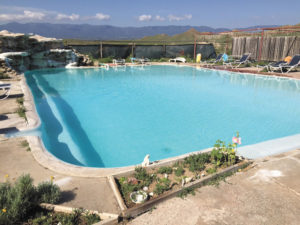By George Sibley
Trying to reduce the personal library a while back, I came across a book titled The Irony of Democracy: An Uncommon Introduction to American Politics. I have no idea where I got it – probably some yard sale – and don’t remember ever opening it. By the reduction standards I’ve set, it should therefore have gone into the box I’m planning to leave on the public library doorstep some night.Instead, I did the undisciplined thing and opened it, intrigued by the title – which better reflected what I was feeling about this current election than anything I remembered from my high school civics class. I discovered that it was a political science textbook – and not a recent one; it was the seventh edition of a textbook first published in 1970, way back in the early Nixon era, by Drs. Thomas Dye and Harmon Zeigler. The seventh edition came out in 1987, when President Reagan was backing off on all his bold promises to reduce the government, taxes and everything else Republicans continue to believe to be bad. What I like about that old volume is how accurately it predicts what has been happening since 1987.
The thesis of The Irony of Democracy is outlined in the introduction: “Elites, not the masses, govern America. In an industrial, scientific, and nuclear age, life in a democracy, just as in a totalitarian society, is shaped by a handful of people.” Elites are defined as “leaders in government, industry, education, and civic affairs; the well-educated, prestigiously employed, and politically active.” The masses are the rest of us – the people to be educated, employed, and managed.
That definition probably doesn’t surprise anyone who depends on the almost incomprehensibly vast and complex systems, public and private, that dependably deliver the water, food, electricity, energy fuels, and everything else we need to survive – including the stable environment enabling those things to happen. These systems are developed, assembled, and managed by groups of specialists whose knowledge becomes a form of power that we have no choice but to grant to them if we want the goods and services they promise (which a media elite assures us we do). Elections are staged to convey the impression that we the people are really in control, but (as Reaganites and Obamoids alike might conclude), “no matter who you vote for, the government gets in.” Dye and Zeigler document this, cataloging the preponderance of lawyers, financiers, scientists, technocrats, and managers drawn from the same upper-class elite-college pool for every administration since World War II.
Part of the irony in this simulacrum of democracy, according to Dye and Zeigler, is that “the elites must govern wisely if government ‘by the people’ is to survive.” In other words, the power of those who run the society is proscribed, directed and somewhat limited by the fact that, if they don’t produce the goods, services and management, private and public, that are promised, then we the people will rise against them. Paraphrasing José Ortega y Gasset (in The Revolt of the Masses), if we get no bread, we will burn down the bakery.
Dye and Zeigler do not have a high opinion of the masses, a.k.a. “we the people.” The following paragraph, probably from the 1970 edition, is stark, especially in light of this past year politically:
“If the survival of the American system depended on an active, informed and enlightened citizenry, then democracy in the United States would have disappeared long ago, for the American masses are apathetic and ill-informed about politics and public policy. Moreover, they have a surprisingly weak commitment to democratic values of individual dignity, equal opportunity, the right to dissent, freedom of speech and press, religious tolerance and due process of law.”
These harsh judgments are supported by studies and surveys cited in the book – around questions like whether schoolteachers ought to be allowed to raise ideas or opinions contrary to community culture: community leaders say “Yes”; the general citizenry says “No.”
So, if we the people are generally apathetic, uninformed, and uncommitted to the foundational values of American democracy, how has democracy survived here? That, claim Dye and Zeigler, is the ultimate irony of democracy: “Elites, not masses, are most committed to democratic values …. Fortunately, the American masses do not lead; they follow. They respond to the attitudes, proposals and behavior of elites.”
This is an unflattering picture of American democracy, but it is hard to dispute at the state and national levels, where we get herded around by the mainstream media like flocks of sheep. I do believe we do better, in some places, not everywhere, at the local level in both public and private activity, where we at least know the players in a relatively personal way, minimally filtered by media.
[InContentAdTwo] What happens if some or all of the elites fall down on the social contract – that is, stop delivering the goods and services? Or start taking an unfair share from the commonwealth? Or start thinking of themselves as an entitled aristocracy, self-made or by birth, with no inconveniencing democratic obligations? These in fact have all been happening in what we can call “the Reagan era.” Reagan himself ran and was elected in 1980 as an “outsider” – someone who was going to come in and downsize the government. He failed at that, but did restore the Gilded Age maxim, “God loves those who help themselves, so help yourselves!” Those who had the wit or the wherewithal have indeed helped themselves, through the savings & loan scandal, the dot-com boom-bust, the housing bubble, nearly bringing the economy to its knees more than once, while those who were not so clever, or greedy, or who were fundamentally, naively decent, went into a long, slow stagnation and decline – a decline that came to encompass and negatively impact most of the American middle class.
In such a situation, with the contract between the elites and the masses frayed, Dye and Zeigler forecast the rise of “counter-elites” – “mass-oriented leaders who express hostility toward the established order and appeal to mass sentiments: extremism, intolerance, racial identity, anti-intellectualism, egalitarianism, and violence.” They note that these counter-elites can come from either the left or the right. “‘Right’ counter-elites express mass reaction against change – political, social, economic, technological – whereas ‘left’ counter-elites demand radical and revolutionary change.” They listed several cultural challenges that support the rise of counter-elites: military losses or stalemates, concern about personal safety in the society, and “economic dislocation” (recession, depression, stagnation, chronic unemployment, technological changes, loss of local industries).
That was written 30 to 45 years ago, but could a more accurate description of the roil and boil underlying the 2016 election have been written today? “Make America great again” from a passing and passed-over generation that feels economically and culturally disenfranchised? And the Sanders revolution from a coming generation that feels economically and culturally ignored?
Aspects of both movements seem to escape standard “right” and “left” designations. At the bottom of it, both mass movements were driven by an angry but legitimate, if not always well articulated, complaint about the failure of the elites to fulfill their end of the social contract: for example, bankers who steal from their customers, legislators who refuse to legislate, politicians who unashamedly work for the “haves and have-mores” (thanks, W.) who finance their campaigns, corporations whose boards take their factories and money out of the country, billionaires who pay no taxes, bread-and-circuses media that constantly and consistently lower popular taste and expectations.
But beyond the articulation of a sometimes-righteous anger that will not be denied, Dye and Zeigler see no good coming from the counter-elites, who front for masses moved by extreme, simplistic or scapegoating measures, and tend toward instability built on often willful ignorance. The Sanders revolution this year was probably as good as counter-elite uprisings get. The dialogue between Sanders and Clinton – who is unquestionably, and unashamedly, a political elite – was always honest and usually respectful, and in the end Sanders accepted the extent to which Clinton was trimming her sails to catch the counter-elite wind, and he yielded with grace.
I will add that to call Hillary Clinton “part of the political elite” is descriptive, not judgmental. I believe, in fact, that she probably represents the elites at their best – a dedicated public servant who gets her thrills doing the right thing as much as she is able to. The Republicans and the mainstream media have done their misogynistic best to tear her down, but except for a stupid move on emails on her part (at the suggestion of a Republican), they have failed to prove anything against her beyond a mild introversion.
But the same cannot be said for the Trumpian counter-elite. Trump ascended through a brutal intraparty brawl and is trying to win in the same no-holds-barred way. I am hoping that by the time you read this, the Donald will just be bad history, but the xenophobic, racist, misogynistic poison he has poured into the cultural well will be haunting us for a long time, even if he loses – and the worse he loses, the more toxic will be the haunting. If he wins? God bless America. The irony will be dead, along with the democracy.
George Sibley lives, writes, and votes in Gunnison, and likes to hear from readers – george@gard-sibley.org



